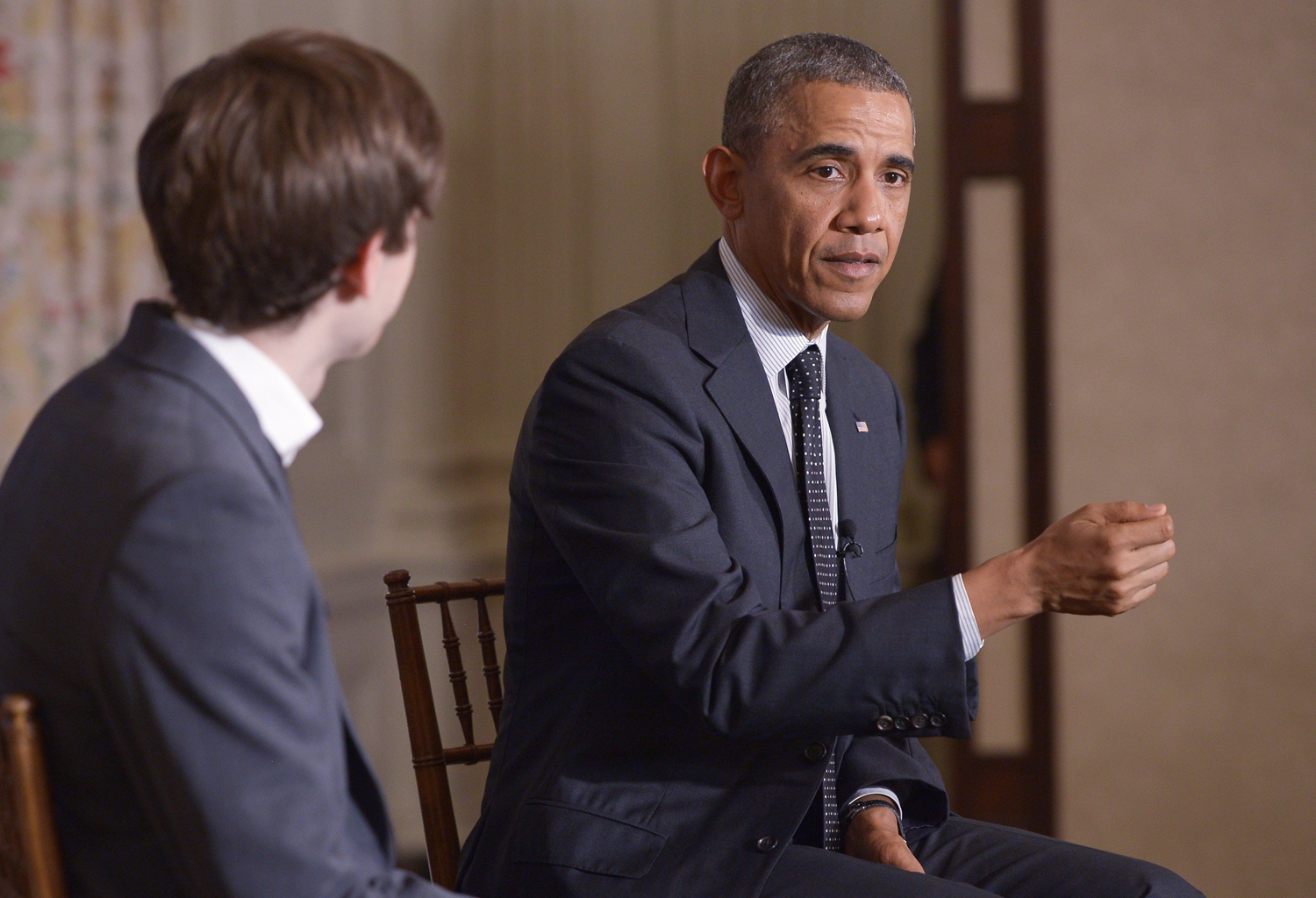
During a Tumblr chat at the White House this week, President Barack Obama winked at the crowd of youngsters as he discussed his high school years. “I actually loved math and science until I got into high school,” Obama said. “And then I misspent those years.” He paused and smiled while the crowd, naturally, erupted with laughter.
The President’s allusion was clear: he spent his high school years in Hawaii smoking joints with his friends. Well into his second term with his poll numbers declining and his ability to push legislation through Congress diminished, Obama is becoming more vocal about his past drug use as both a cautionary tale and to connect with young audiences.
His frankness coincides with evolving national attitudes toward drugs. Since his re-election, Colorado and Washington State have legalized marijuana for recreational use, while more states have moved to decriminalize possession of cannabis. The White House Office of National Drug Control Policy has been relegated to a minor role. Meanwhile, the Obama administration is deep into a top down revision of the what Attorney General Eric Holder has called “draconian” mandatory minimum sentences for drugs.
Long before Obama became a Presidential candidate, he used his own drug use was central storyline in his 1995 memoir Dreams from my Father. “Nobody asked you whether your father was a fat-cat executive who cheated on his wife or some laid-off joe who slapped you around whenever he bothered to come home,” Obama wrote of his drug-filled years. “You might just be bored, or alone. Everybody was welcome into the club of disaffection. And if the high didn’t solve whatever it was that was getting you down, it could at least help you laugh at the world’s ongoing folly and see through all the hypocrisy and bullshit and cheap moralism.”
As he sought higher office, that part of the Obama narrative faded from view. In the heat of the 2008 primary, Hillary Clinton’s New Hampshire co-chair, Billy Shaheen, resigned his position after suggesting that Republicans would use Obama’s drug history against him, even suggesting Obama once sold drugs, a charge that prompted a personal in-person apology from Clinton to Obama.
But Obama’s re-election opened the floodgates for presidential drug talk. “I remember when BuzzFeed was something I did in college around 2 a.m.,” he cracked at the White House Correspondents Dinner last year. This year he called Colorado’s legalization effort “an interesting social experiment.”
White House aides caution that the move is not a strategic shift, but concede that his openness on the subject is a reflection of his newfound freedom having put his final campaign behind him. Yet the timing of it all hasn’t gone unnoticed. Over the past year, the Obama Administration has been rolling out piecemeal reforms to sentencing laws aimed at reducing the number of low-level prisoners facing lengthy sentences for drug crimes.
Though Congress stalled on legislation that would cap the mandatory sentences blamed for filling the nation’s federal prisons, the Obama Administration has urged judges to avoid mandatory minimums. Holder has singled out states for disenfranchising former prisoners, calling for an all out repeal of such laws in February. After Obama commuted the sentences of eight federal prisoners facing life sentences for nonviolent drug offenses in December, the administration wanted more, launching a massive call for applications for commutations, and removing the head of the U.S. Pardon office in the process.
Last week, Attorney General Holder formally backed a U.S. Sentencing Commission proposal that could reduce the prison sentences of 20,000 people currently behind bars for nonviolent drug offense. The measure could reduce sentences by an average of 23 months. Obama met with the commission on Wednesday to be briefed on the proposal. Combined with the My Brother’s Keeper initiative to provide paths to opportunity for young minority men, it’s as if President Obama had a heart-to-heart with young Barry O—the young man he wrote about heading toward becoming a “Junkie. Pothead.”
He has also been sharing his story with young people. “When it was my turn, I explained to them that when I was their age I was a lot like them,” he retold in February, about a meeting the previous year with a group of Chicago teenagers. “I didn’t have a dad in the house. And I was angry about it, even though I didn’t necessarily realize it at the time. I made bad choices. I got high without always thinking about the harm that it could do. I didn’t always take school as seriously as I should have. I made excuses. Sometimes I sold myself short.”
In a wide-ranging interview with The New Yorker’s David Remnick late last year, Obama referenced his own past to call for a new approach, “We should not be locking up kids or individual users for long stretches of jail time when some of the folks who are writing those laws have probably done the same thing,” he said.
The drug reforms could well become the defining domestic policy achievements of his second term, but in the short term, the nods to his “misspent” past keep him relevant among his most loyal supporters: youth. Speaking at a high school graduation last week in Massachusetts he admitted that he did not recall his own graduation speaker, drawing a laugh from the assembled students. “I have no idea who it was,” he said. “I’m sure I was thinking about the party after graduation. I don’t remember the party either.”
More Must-Reads from TIME
- Cybersecurity Experts Are Sounding the Alarm on DOGE
- Meet the 2025 Women of the Year
- The Harsh Truth About Disability Inclusion
- Why Do More Young Adults Have Cancer?
- Colman Domingo Leads With Radical Love
- How to Get Better at Doing Things Alone
- Michelle Zauner Stares Down the Darkness
Contact us at letters@time.com



